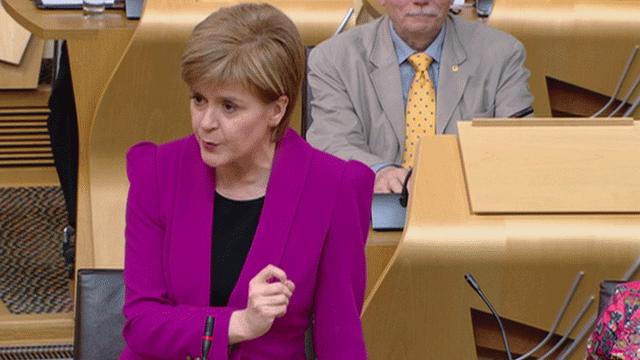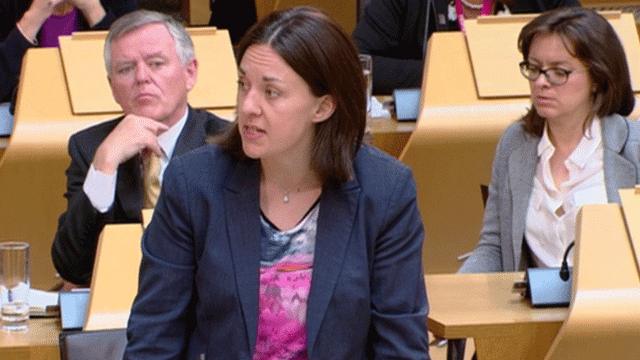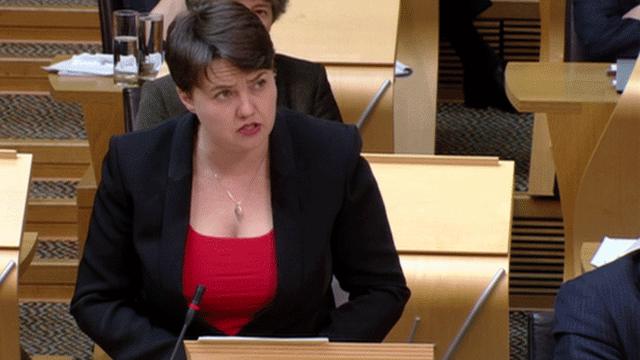Nicola Sturgeon to ask David Cameron for greater devolved powers
- Published

Nicola Sturgeon was speaking at Holyrood for the first time since the general election
Scotland's First Minister Nicola Sturgeon will ask the prime minister to give Holyrood powers to set the minimum wage and control National Insurance.
She told MSPs that she expected to meet David Cameron later this week.
The SNP won 56 of the 59 Scottish seats at the general election, making it the third largest political party in the House of Commons.
Ms Sturgeon said she hoped Mr Cameron would agree to look again at plans to hand more powers to Holyrood.
After the "No" vote in last September's Scottish independence referendum, Lord Smith of Kelvin was appointed to look at what additional powers might be handed to Scotland.
The Smith Commission, external made a series of recommendations which were approved by Scotland's political parties.
Ms Sturgeon, the first minister and leader of the SNP, told MSPs that she had a phone conversation with Mr Cameron on Friday and had subsequently written to him asking for a meeting.
Ms Sturgeon told the Holyrood chamber that last week's election result, which saw the SNP increase its seat tally from six to 56, was of "truly historic proportions".
Of her impending meeting with Mr Cameron, whose Conservative Party won a majority in the election, she said: "Public spending and the protection of Scotland's budget will be key issues on the agenda when we do meet. The issue too of more powers for the parliament must form part of our discussions.
"If the PM and his government mean what they say about respecting the outcome of the election in Scotland, they must now agree with us a process which looks again at the Smith Commission proposals with a view to extending devolution even further and that is a process that must be made here in Scotland."
'Grow revenues'
She added: "As a matter of priority we want to see devolution of powers over employment policy including the minimum wage; welfare; business taxes; National Insurance and equality policy - the powers we need to create jobs, grow revenues and lift people out of poverty."
In response to Ms Sturgeon's statement, Scottish Labour's Deputy leader Kezia Dugdale wished the SNP's "strong team at Westminster" well, and urged it to oppose Conservative efforts to repeal the Human Rights Act.

Scottish Labour's Deputy leader Kezia Dugdale wished the SNP's "strong team at Westminster" well

Scottish Conservative leader Ruth Davidson congratulated Ms Sturgeon on the SNP's election performance
She said: "These benches will do everything that we can to oppose any attempt that the Tories make to scrap the Human Rights Act.
"Enacted in the early days of a fresh Labour government full of hope and aspiration for the future, the Act embodies the civil and political rights which are fundamental to any liberal democracy."
Ms Dugdale also said there was "fear and trepidation in the air" in Scottish communities over Tory plans to "attack disability benefits".
Scottish Conservative leader Ruth Davidson congratulated Ms Sturgeon on the SNP's election performance, and also Prime Minister David Cameron "in managing what no Prime Minister has done since 1955 - increasing the number of votes and seats while already in office".
Union talks
She said: "While in Scotland we did not manage to add to the seats total, we did contribute to the share of the vote with 434,000 fellow Scots voting for the Conservative Party - the most in any election since devolution."
Ahead of her appearance in the chamber of the Scottish Parliament, Ms Sturgeon held talks with the Scottish Trade Union Congress in which a Memorandum of Understanding urging Mr Cameron to end his pursuit of economic austerity was agreed.
The newly-appointed Scottish secretary, David Mundell, told BBC Scotland on Tuesday that the Smith proposals were the "right package" for the country and would give the Scottish Parliament "the powers that it needs to be an effective and powerful devolved parliament within the context of a United Kingdom".